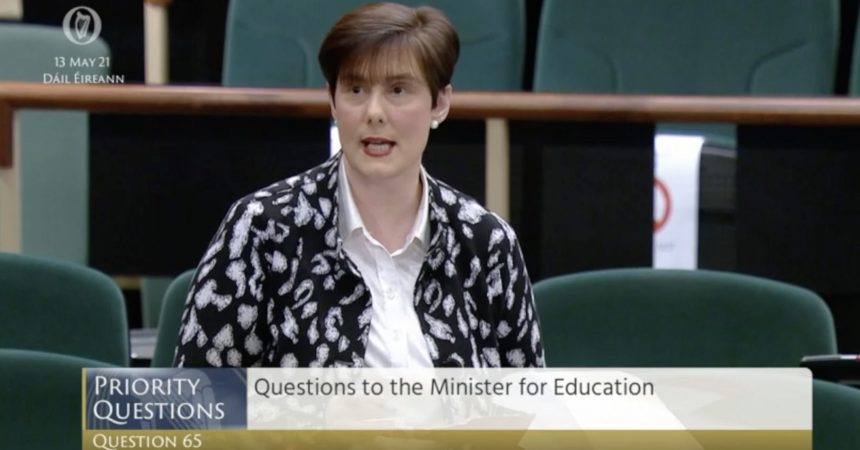
Education Minister cannot rely on NCCA to deliver objective sex education – the law must change
In the Dail yesterday Donnchadh O’Laoghaire from Sinn Fein asked the Minister for Education about sex education in schools. You can view and read the full exchange here. In her response the Minister acknowledged that RSE was an important right for students. She also said that:
“The Department of Education is working closely with the NCCA which continues the process of curricula development and publishing additional resources for SPHE and RSE to determine the approach to best give effect to this commitment in the Programme for Government and this does include legislative change if necessary.”
But the Minister cannot rely on the NCCA for advice about whether legislative change is necessary. In principle, the NCCA are obliged to take into account the practical application of their recommendations, but in practice, they claim that they cannot advise the Minister to change the law. They therefore make recommendations that are restricted by the current law, which means that the problem is not properly addressed.
Legislative change is necessary
Legislative change is necessary as the legal position now is that RSE can be delivered according to the ethos of the Patron. The introduction of Flourish shows the need for legislative change, but even without Flourish a look at RSE policies in schools shows that ethos has a significant impact on the delivery of RSE at primary and second level.
If the issue of ethos is meaningless then why is it still in place? The fact of the matter is that children can still be refused access in some schools because of ethos, teachers can be fired because of ethos, minorities are forced into religion classes in schools because of ethos, yet the final Report from the NCCA has said that it comes way down the list of teacher priorities in the delivery of RSE.
Legally schools are obliged to provide health education for students, and to consult with parents while having regard to the ethos of the school (Section 9 (d) Education Act 1998). Consulting parents doesn’t mean the ethos of a school is going to change. That just doesn’t happen. Even if all the parents and students want objective RSE, that doesn’t mean that they are going to get that.
Under the Irish Constitution parents have all the rights but have no practical power on the ground in schools. That legal power rests with the Patron, the Patron in most cases is the Catholic Bishops. Boards of Management are obliged to uphold the ethos of the Patron and Section 37 of the Employment Equality Act is still in place, which obliges teachers to uphold the ethos of the school. Parents and students take second place with regard to the teaching of RSE in schools.
Final Report from NCCA in 2019 dismissed ethos as a factor in RSE
In December 2019 the NCCA published their Report on RSE and recommended no legislative change to ethos. They dismissed the influence of ethos in the delivery of Relationship and sexuality education because they said that those working in schools put ethos well down a priority list in which teacher qualification, teacher professional support, time allocation, an up-to-date curriculum and support materials, attracted greater priority.
They also said that when a clearly articulated curriculum and support materials are not in place there is inevitable doubt about what teachers should be teaching and school ethos can then be used as a way of avoiding sensitive topics in some instances. In other words they believe that all is needed is an updated RSE course, teacher training, support materials and guidelines and the issue of ethos will go away. This assumes that we’ll all just put our heads in the sand, and pretend that it is not in the Education Act 1998.
The NCCA Report of December 2019 on the Review of Relationships and Sexuality Education (RSE) in primary and post-primary schools, states:
While the review acknowledges that school ethos can be a source of tension and uncertainty for some schools/teachers when it comes to addressing some aspects of SPHE/RSE the review concludes that at this point school ethos cannot be separated out from other factors that influence the teaching of RSE. The key enabler to more confident and comprehensive teaching of RSE is the development of teacher competence and confidence.
In addition, teachers need to be supported by a clearly articulated curriculum which all schools are supported in enacting and a clear RSE school policy that is enabling and supportive. Enhanced support materials and opportunities for teachers within schools and across schools to share practice are also required. When these elements are not in place, there is inevitable doubt about what teachers should be teaching and school ethos can then be used as a way of avoiding sensitive topics in some instances.”
“When those working on RSE in schools were considering the connection between school ethos and their RSE programmes as a factor in future developments related to RSE, school ethos seemed to come well down a list in which teacher qualification, teacher professional support, time allocation, an up-to-date curriculum and support materials, attracted greater priority.”
Ethos does not come way down the list of priorities for many parents and students. It is a source of concern and worry, especially for families from minority backgrounds. Our children are discriminated against because of ethos.
Ethos is also a concern for many teachers. It is difficult to understand how the NCCA could believe that a teacher from a LGBTQ background would not have issues with a Catholic ethos in delivering RSE. Section 37 obliges teachers to uphold the religious ethos of schools and if schools have an RSE policy that reflects their ethos then all teachers are legally obliged to uphold it.







0 Comments
No comments!
There are no comments yet, but you can be first to comment this article.